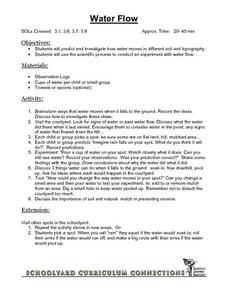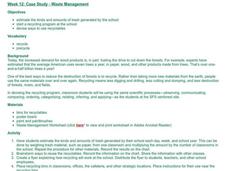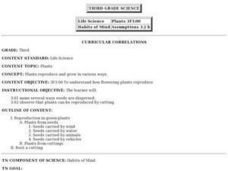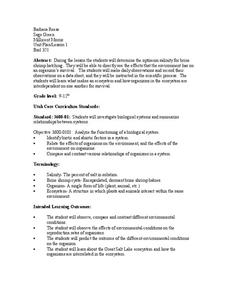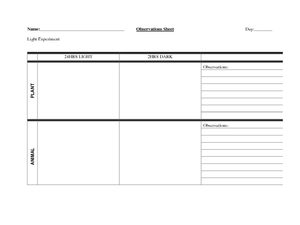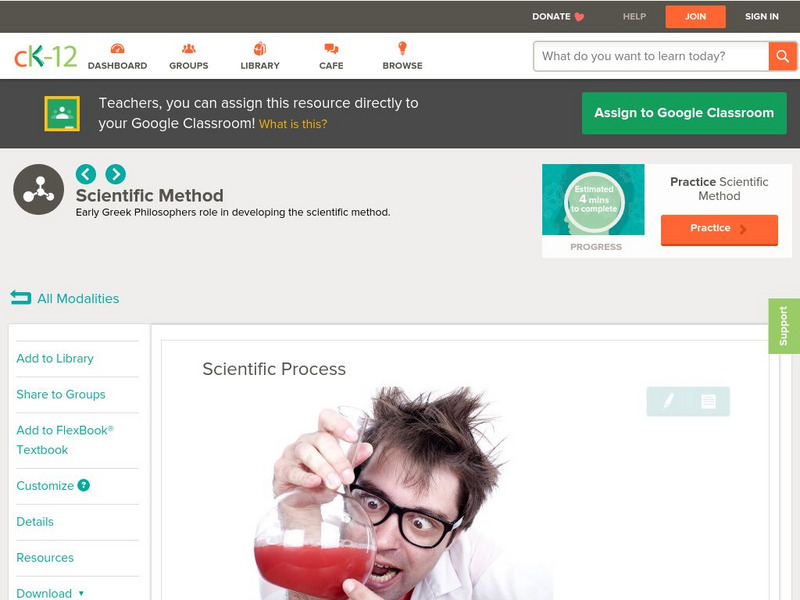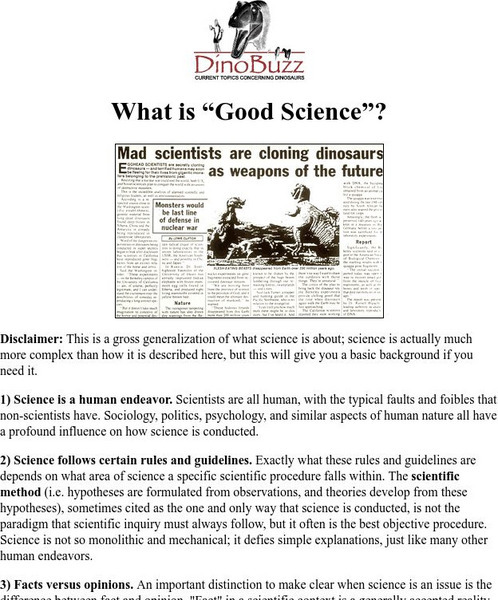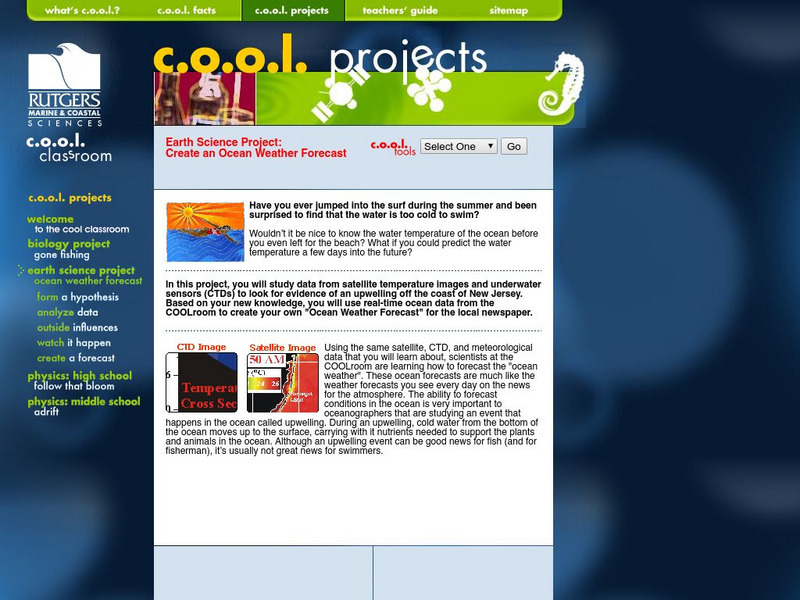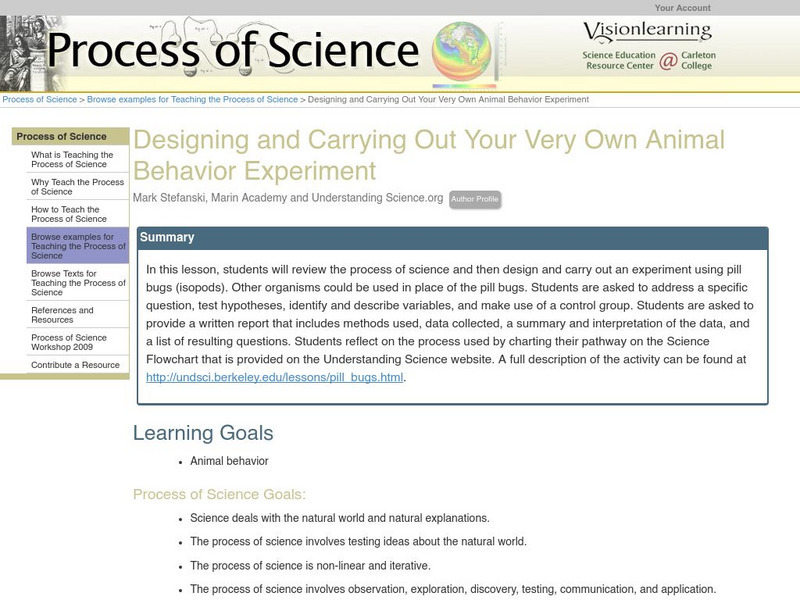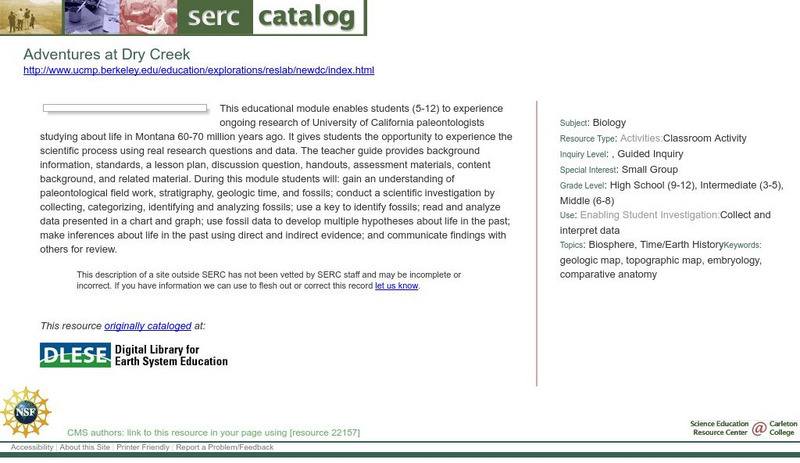Curated OER
JEPSON PRAIRIE RESERVE RESEARCH PROJECT
Young scholars research a field question of their choosing.
Curated OER
Why Is An Apple Like A Suitcase?
Students examine a variety of fruit to discover that each has seeds. Through experimentation, they discover the role that fruit and seeds play in a plant's life cycle.
Curated OER
Looking Back in Time (Alternative Activity)
Students, in groups, devise alternative ways of measuring distances. They view a video and are introduced to the concept of parallax in measuring. They discuss their ideas with the class.
Curated OER
Environment: Water Flow
Students brainstorm the ways that water flows when it falls to the ground. After discussing three things water can do, they investigate and predict water movement outdoors on school grounds. They experiment ways to alter the water flow...
Curated OER
Waste Management
Students set up a recycling program in their school. They first estimate the kinds and amount of trash generated and brainstorm ways to reuse the recyclables and create flyers explaining how their program will work at the school.
Curated OER
What It Is, What It Isn't
Third graders classify and sort different types of beans to be introduced to the classification system in science. As a class, they identify the characteristics of living and non-living organisms and make a chart in their journal to ...
Curated OER
Evaporation
Students break into small groups with four or five students per group. Each is given a styrofoam plate on which they write their group name on and 2 teaspoons of warm water. They place their plate on a paper towel somewhere in the room...
Curated OER
Plants Reproduce and Grow in Various Ways
Third graders take a walk around the outside of the school and examine their clothing to see if they picked up any seeds while on their walk. They discuss how seeds travel and how a new plant thus can form. They then observe root...
Curated OER
Hatching Brine Shrimp
Third graders investigate the environment that is considered favorable for brine shrimp hatching. The salinity level is of particular interest in the observations because the optimum level is needed for survival. They make daily...
Curated OER
Organisms – Their Needs
Young scholars compare and contrast different organisms characteristics. In this life science lesson, students design an experiment about plants and animals needs. They collect data and write their conclusion about the experiment.
PBS
Pbs Learning Media: Scientific Processes
In this interactive activity adapted from NOVA, expand your understanding of the scientific process. Watch two videos featuring animations and interviews with scientists, and notice how the processes unfold and vary from one...
Howard Hughes Medical Institute
Hhmi: Bio Interactive: Using the Scientific Process to Study Human Evolution
View a real-life use of the scientific process by looking at Paleoanthropology in this Click and Learn. The Click and Learn is an interactive slideshow.
CK-12 Foundation
Ck 12: Chemistry: Scientific Process
[Free Registration/Login may be required to access all resource tools.] Role of investigations in science and the steps of the scientific method.
CK-12 Foundation
Ck 12: Physical Science: Scientific Process
[Free Registration/Login may be required to access all resource tools.] Role of investigations in science and the steps of the scientific method.
CK-12 Foundation
Ck 12: Plix: Scientific Process: Physical Science
[Free Registration/Login Required] Put the scientific method steps in order in this interactive flow chart! This site also includes a short quiz over the scientific method.
University of California
Ucmp: What Is "Good Science"?
A very good explanation of the scientific process and the differences between science and non-science. This is a concise and clearly written description.
Smithsonian Institution
Smithsonian Education: Minerals, Crystals, and Gems
Through this series of three lessons, students will gain an understanding of the basics of mineral science. In their investigation they will also work through the scientific process as they practice their observation skills, form...
Other
Rutgers: c.o.o.l. Class: Physics Project: Plankton and Ocean Current
This c.o.o.l. Project focuses on tiny sea plankton and how they move in the oceans. Follow the scientific process outlined on the left, calculate and collect data to form your own predictions.
Other
Rutgers: c.o.o.l. Class: Biology Project: Gone Fishing
In this C.o.o.l. project, you are given a task to complete. You will predict where fish should be found in a specific region.Follow the steps of the scientific process outlined on the left menu bar. Useful educational tool for both...
Other
Rutgers: c.o.o.l. Class: Earth Science Project: Create an Ocean Weather Forecast
Want to learn how to forecast ocean weather? This c.o.o.l. project lists each of the steps in the scientific process, and has you work through each in this earth science based project.
University of California
University of California at Berkeley: How Science Works Flowchart [Pdf]
A flowchart for elementary students outlining how the scientific process works.
Science Education Resource Center at Carleton College
Serc: Designing and Carrying Out Your Very Own Animal Behavior Experiment
Students review the process of science and then use the scientific process to design and carry out an experiment using pill bugs.
Science Education Resource Center at Carleton College
Serc: Adventures at Dry Creek
This educational module enables students (5-12) to experience ongoing research of University of California paleontologists studying about life in Montana 60-70 million years ago. It gives students the opportunity to experience the...
ReadWriteThink
Read Write Think: Digging Up Details on Worms: Using Science in an Inquiry Study
A lesson plan based on a study unit of earthworms, using the inquiry model to integrate scientific processes with literacy practices. Instruction plans, related resources, and standards are included.
Other popular searches
- Scientific Process Skills
- The Scientific Process
- Scientific Process Observe
- Scientific Process Food
- Scientific Process Bridges
- Scientific Process Measure
- Scientific Process Lab
- Scientific Process Vitamin C
- Science Scientific Process





